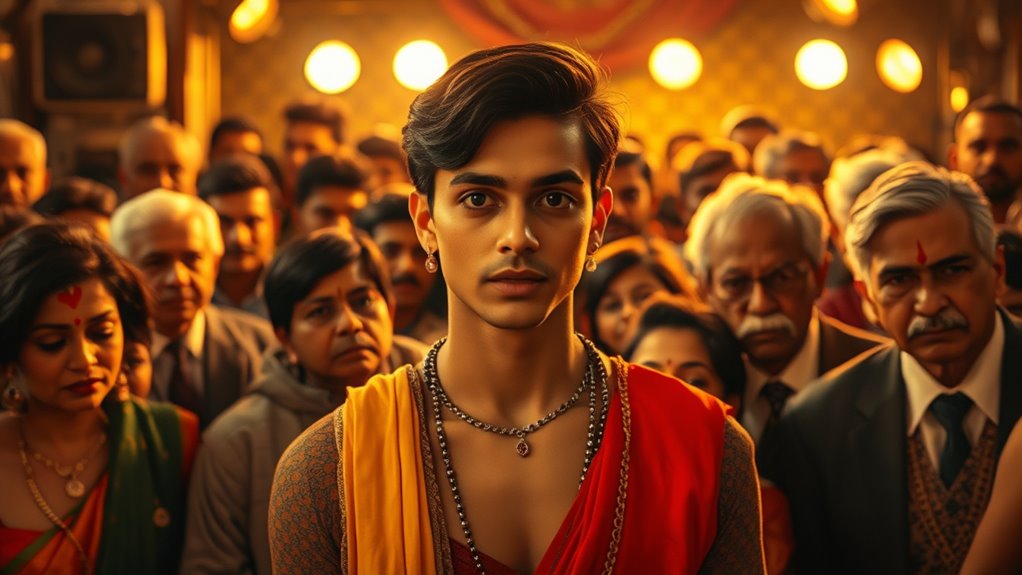Nepotism in Bollywood means that family connections often matter more than talent when it comes to opportunities and success. Industry insiders tend to favor those with known pedigrees, making it harder for outsiders to break through despite their skills. This favoritism can limit diversity and innovation, keeping a system that rewards familiarity over merit. To understand how ingrained this issue is and what might change, you’ll discover more about the ongoing debate and its impact.
Key Takeaways
- Nepotism in Bollywood favors industry insiders with family ties, often at the expense of talented outsiders.
- Casting bias and recommendations reinforce the cycle of family dominance and limit diversity.
- Opportunities are primarily accessible to those with established connections, reducing merit-based selection.
- Nepotism impacts industry evolution by stifling fresh voices and perpetuating favoritism.
- Addressing bias through fair talent recognition methods could promote a more equitable Bollywood industry.

Have you ever wondered why certain families seem to dominate Bollywood? It often feels like a small circle where opportunities seem more accessible to those with a family connection rather than raw talent. This phenomenon isn’t accidental; it’s rooted in casting bias and the way talent recognition often leans towards familiarity. When casting directors and producers look for new faces, they tend to favor actors with a known lineage, believing that familiarity equates to marketability. This creates a cycle where family connections open doors that might otherwise remain closed to outsiders, regardless of their potential or skill.
Casting bias plays a significant role in perpetuating nepotism. Instead of scouting fresh talent based solely on merit, industry insiders often lean on existing networks, favoring candidates who are already part of the film fraternity. This bias isn’t always overt, but it manifests in subtle ways—recommendations from influential industry figures, preferential auditions, or even the simple familiarity of a name. As a result, talented newcomers without family ties struggle to get noticed, no matter how deserving they are. The industry, consciously or unconsciously, tends to prioritize known faces, reinforcing the idea that a famous surname guarantees success.
Talent recognition becomes skewed in this environment. When nepotism is at play, the focus shifts from skill, versatility, and hard work to lineage and connections. An actor with a famous last name might receive opportunities that a talented outsider could only dream of, simply because their family name carries weight. This not only stifles diversity but also discourages genuine talent from breaking through the barriers of industry bias. Aspiring actors who lack those connections face an uphill battle, often having to prove themselves much more than their well-connected counterparts.
This isn’t to say that all industry insiders are biased or that talented individuals from film families don’t deserve their success. However, the systemic favoritism and casting bias make it clear that opportunities are often unevenly distributed. When talent recognition is overshadowed by family legacy, the industry loses out on fresh perspectives, innovative performances, and new voices that could elevate Bollywood even further. Additionally, the influence of AI security and bias detection technologies in many industries suggests that similar methods could be applied to identify and mitigate nepotism biases in casting and talent recognition processes. Ultimately, the ongoing debate about nepotism highlights the need for a more equitable approach—one where raw talent, dedication, and potential are the true criteria for success, rather than family connections alone.
Frequently Asked Questions
How Does Nepotism Affect New Actors’ Chances of Debuting?
Nepotism can considerably limit your audition opportunities, as casting biases often favor industry insiders‘ family members. You might find it harder to get noticed or considered for debut roles because producers and directors tend to prefer familiar faces with connections. This creates an uneven playing field, making it more challenging for new actors without industry links to break into Bollywood and showcase their talent.
Are There Any Bollywood Actors Who Successfully Oppose Nepotism?
Did you know that some Bollywood actors actively oppose nepotism? You’ll find celebrities like Kangana Ranaut and Swara Bhasker voicing their opinions, often engaging in celebrity activism to challenge industry norms. They support independent filmmakers and fresh talent, proving you can succeed without nepotism’s help. By speaking out, they inspire new actors to pursue their dreams authentically, showing that change is possible when outspoken stars stand against unfair industry practices.
What Role Do Talent Agencies Play in Perpetuating Nepotism?
Talent agencies influence Bollywood by shaping talent recruitment, often favoring industry insiders or those with connections. Their agency influence can perpetuate nepotism by prioritizing clients with industry ties, making it harder for outsiders to break through. You might notice that agencies tend to promote familiar faces, reinforcing existing networks and limiting opportunities for fresh talent. This cycle keeps nepotism alive, as agency decisions markedly impact who gets visibility and roles in the industry.
How Has Social Media Influenced the Nepotism Debate?
You’ve probably noticed that 70% of Bollywood’s top actors are from film families, highlighting the industry’s nepotism. Social media amplifies this by fueling online campaigns and celebrity activism, making debates more visible. It pressures industry insiders and encourages fans to question fairness, pushing for change. Your engagement online can influence perceptions, showing how social media shapes the ongoing nepotism debate and sparks conversations about meritocracy in Bollywood.
Can Policies Be Implemented to Reduce Nepotism in Bollywood?
You can support industry reforms and advocate for policy solutions that promote merit-based opportunities in Bollywood. Implementing transparent audition processes, establishing independent bodies to oversee casting decisions, and enforcing strict anti-nepotism regulations can help reduce favoritism. By pushing for these policies, you contribute to a fairer industry where talent and hard work are valued over family connections, encouraging more diversity and genuine merit in Bollywood.
Conclusion
As you’ve seen, nepotism in Bollywood is a double-edged sword, shaping careers and stirring controversy alike. While it offers opportunities, it also sparks debates about fairness and merit. Remember, sometimes the cream rises to the top, but other times, the deck feels stacked. It’s up to you to decide whether this system truly fosters talent or simply keeps the same faces in the spotlight. The industry’s future depends on breaking the mold and giving everyone a fair shot.









